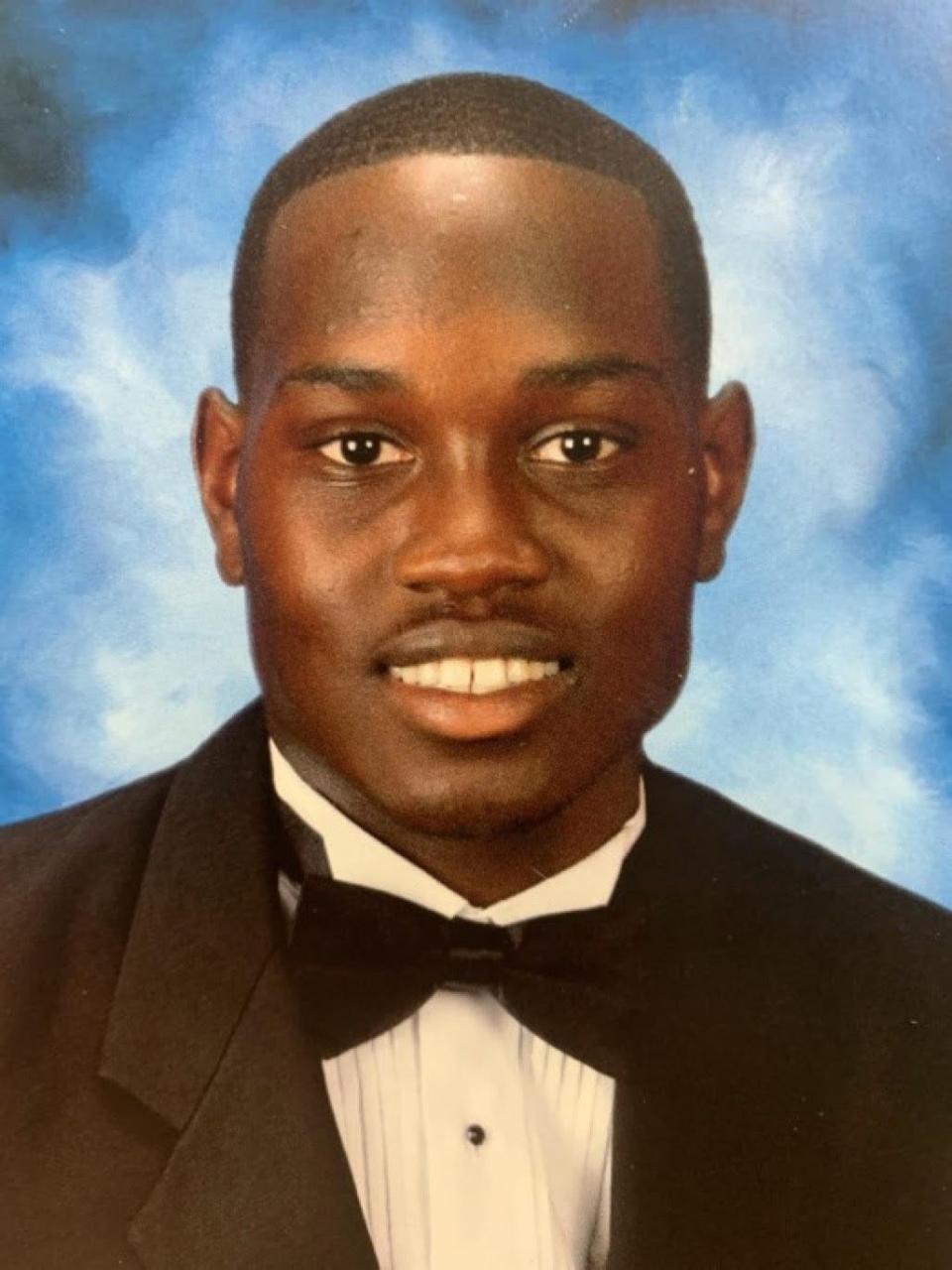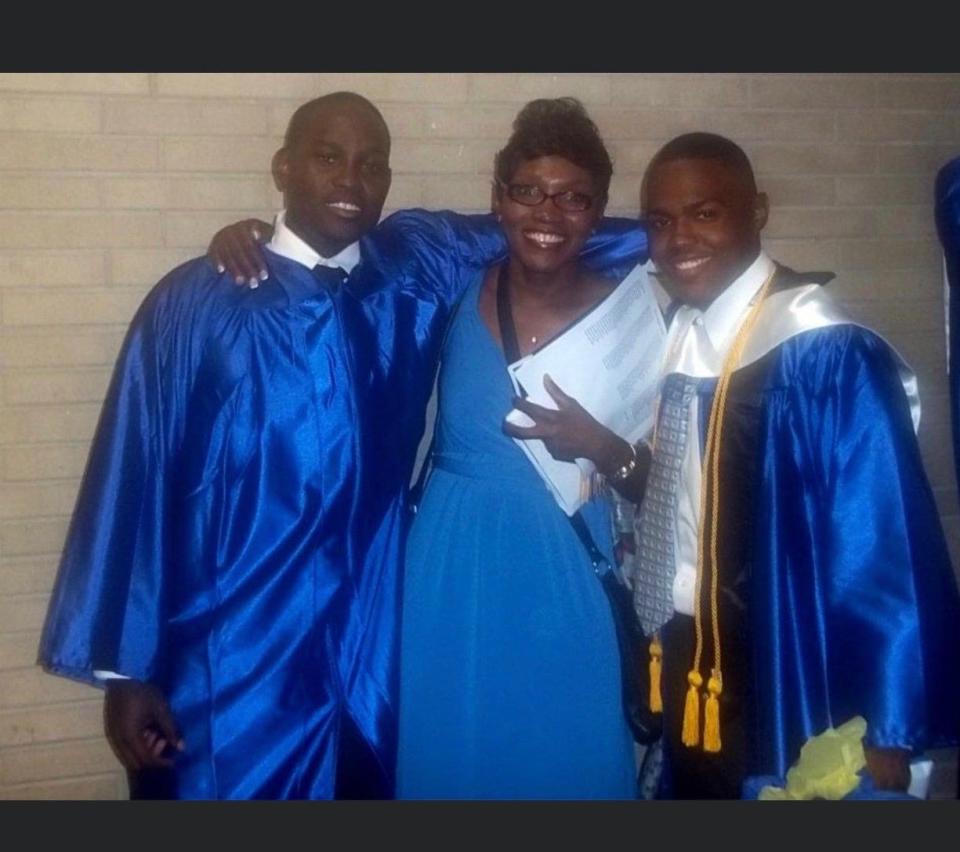A 'lynching' or self-defense? 3 Georgia men go on trial in the 2020 murder of Ahmaud Arbery
The murder trial of the three white men charged in the death of 25-year-old Black jogger Ahmaud Arbery is set to begin Monday, a case where no arrests were made for months until video of the shooting emerged publicly and sparked protests.
Arbery was fatally shot while jogging Feb. 23, 2020, and the cellphone video of his last moments recorded by one of the defendants is at the center of the case. The eyes of the nation will fix on Brunswick, a small Georgia town about 70 miles south of Savannah, where defendants Greg McMichael, his son Travis and their neighbor William “Roddie” Bryan are well-known.
Defense attorneys say the McMichaels pursued Arbery to make a citizen’s arrest because they suspected he was a burglar and that Travis McMichael, 35, shot Arbery in self-defense. Bryan’s lawyer maintains he was only a witness to the crime. Prosecutors and Arbery’s family say Arbery committed no crimes.

Public figures including civil rights attorney Ben Crump and Atlanta Mayor Keisha Lance Bottoms have condemned the killing, calling it a “lynching.”
No arrests were made in the case for more than two months until video of the incident –shot by Bryan – was released by a Georgia attorney, drawing national outrage further fueled by the high-profile police killings of George Floyd, Breonna Taylor and other Black Americans.
The McMichaels and Bryan were later indicted on state charges of felony murder and malice murder, two counts of aggravated assault, and one count of false imprisonment and criminal attempt to commit false imprisonment.
The trio also faces federal hate crime charges and a wrongful death civil lawsuit from Arbery’s mother, Wanda Cooper-Jones.
'A good kid': Ahmaud Arbery remembered as 'humble guy' with plans to become an electrician
More: What to know about the killing of jogger Ahmaud Arbery and the Georgia men on trial
Video allows 'each side to introduce their own narrative'
Although the shooting was captured on video, several key moments are missing, and attorneys have offered competing narratives about what led to the fatal confrontation.
Gregory McMichael, 65, and his son armed themselves and pursued Arbery in their truck because they suspected Arbery was responsible for break-ins in the Satilla Shores neighborhood where they lived, according to Rob Rubin, Travis McMichael's attorney.
Police records do not show burglaries in the neighborhood from January to Feb. 23, but local media reported three thefts about two months before the shooting.
Bryan, 52, joined the “hot pursuit,” according to a memo obtained by USA TODAY written by one of the district attorneys previously leading the investigation.
Gregory McMichael told police that Bryan unsuccessfully tried to block Arbery with his truck, but Kevin Gough, one of Bryan's attorneys, maintains his client is “just an ordinary guy caught up in a tragic circumstance.”
“Roddie Bryan was only armed with a cellphone and far away at the time Mr. Arbery was killed,” Gough said.
In the short clip taken by Bryan, a white pickup blocks the view of the beginning of the struggle. A gunshot is heard, then Arbery and Travis McMichael are seen with their hands on a weapon that is angled upward, toward Arbery.
The struggle again goes out of view and Gregory McMichael is seen in the back of the truck. A second shot is heard, and the camera shifts back to the fight where Arbery is throwing punches.
A third gunshot is heard, and Arbery falls to the ground.
Ahmaud Arbery video: Legal experts explain how key frames may be used in murder trial
Arbery was shot twice in the chest and a third bullet grazed his right wrist, according to an autopsy report released by the Georgia Bureau of Investigation.
Although the video is “very damaging” to the defense, the gaps “will allow each side to introduce their own narrative” about the encounter, said Ronald Carlson, professor emeritus at the University of Georgia School of Law.
“This leaves it open for the defense to argue Travis was holding the shotgun on Arbery, Arbery grabbed the barrel of his shotgun, pulled it toward him and that’s when the gun went off,” Carlson said. “The prosecutors are left without a direct witness ... without the ability to respond with direct evidence of what was going on during the time of those gaps.”
Murder charges will be 'relatively easy to prove,' one expert says
The felony murder charges against all three defendants will be "relatively easy to prove" because attorneys need to show only that the men killed Arbery while committing one of the felonies they are charged with (aggravated assault or false imprisonment), said Sarah Gerwig-Moore, a law professor at Mercer University in Atlanta.
Video showing the vehicles blocking Arbery’s path may be enough to prove false imprisonment, she said, and pointing a deadly weapon at Arbery is one of the ways to prove aggravated assault.
The defendants are also charged with malice murder, which requires prosecutors to prove the defendants caused Arbery’s death with an “abandoned and malignant heart” and without provocation. Evidence that the killing was motivated by Arbery's race could support that charge, Gerwig-Moore said.
Because the defendants are charged individually and as “parties to a crime," if the state can prove one of them committed the crime and they were all acting together, all three men can be convicted on all the charges, Gerwig-Moore added.
Defense attorneys are expected to argue the defendants were trying to place Arbery under citizen's arrest.
Georgia allowed private citizens to detain someone suspected of committing a felony in their presence until last May,when Gov. Brian Kemp repealed the law in the wake of Arbery’s death.
Rubin, Travis McMichael's attorney, said the case then turns "into a self-defense matter."
In Georgia, self-defense does not apply if the person who fired the shots created the dangerous situation, Gerwig-Moore said.
To counter the malice murder charge, the defense would need to argue the McMichaels and Bryan “were provoked in some way that would make their actions reasonable,” she said.
“That’s going to be a hard hill to climb,” she said.
'Race will be front and center' at Arbery trial
The McMichaels and Bryan face federal, not state, hate crimes charges because Georgia didn't have hate crime legislation until June 2020. Kemp signed the bill after facing public pressure over the video of Arbery's death.
Still, prosecutors have asked the judge to allow them to present evidence supporting the idea that racial bias led to the killing.
Bryan told investigators that he heard Travis McMichael call Arbery a racial slur after the shooting, according to testimony from Richard Dial, a Georgia Bureau of Investigation special agent, who spoke during a probable cause hearing last June.
Carlson, the former UGA professor, said the judge may allow the jury to hear this allegation, but said race likely won’t be the key strategy for the prosecution.
"They’ve got plenty going without opening the door on the racial issue," he said.
Rubin rejected the idea race played a role in the shooting. Gough added, “This is not a racial case and it never was.”
Who gets to decide what is racism, hate? Debate over white violence, privilege renewed in Georgia
Here's why:The white men accused of killing Ahmaud Arbery won't face Georgia hate crime charges
There is also concern the defense will try to exclude potential jurors based on race, and the court must ensure the jury reflects the county's diversity and includes Black voices, said Brandon Buskey of the American Civil Liberties Union. Brunswick, which has just over 16,000 residents, is predominantly Black, but sits in the overwhelmingly white Glynn County, from which the jury will be selected.
“Race will be front and center,” he said. “You could probably go the entire trial as a prosecutor or defense attorney and not utter the word 'race' and it will still be at the heart of this case.”
Glynn County Commissioner Allen Booker, who grew up with Arbery’s father, said Black residents of Brunswick are concerned Arbery’s killers won’t be brought to justice because they are white.
“We’ve seen all too often white people get off for killing Black people," Booker said.
Seeing a young Black man "hunted down" by white men was traumatic for many people, he said.
“It was hard for us to believe we had that level of hate."
What we know about the community where Arbery was shot: 911 caller reported 'Black guy' on property
Why jury selection could be complicated
The video of Arbery's death brought national media attention that will likely make it challenging to find jurors with no knowledge of the case.
Rubin said he thinks it will be difficult to find jurors who can put aside what they’ve seen and heard and make a decision based on evidence. He expects the jury selection process will take about two weeks.
He also expressed concern about potential protests during the trial and the pressure it would put on the jury.
In September, law enforcement officials formed a group called Glynn Unified Command "to ensure a peaceful jury selection and trial process."
12 jurors must set aside what they saw on video: How will lawyers find an impartial jury?
Meanwhile, the McMichaels' connections in the community have complicated the case, and Carlson said it’s possible the defense will find a sympathetic jury.
Greg McMichael previously worked as a Glynn County police officer and an investigator for Brunswick District Attorney Jackie Johnson.
Johnson had to recuse herself from the case because of the connection, and a grand jury indicted her last month amid accusations she used her position to discourage police from making arrests in the case.
More: Why it took more than 2 months for murder charges and arrests in the death of Ahmaud Arbery
The second prosecutor assigned to the case, Waycross Judicial Circuit District Attorney George Barnhill, also had to recuse himself because he was recommended by Johnson, who failed to disclose she asked him to advise police on Arbery’s death. This came after Barnhill sent a letter to Glynn police saying the pursuit was "perfectly legal" under the citizen’s arrest law and the shooting was self-defense because "Arbery initiated the fight.”
The district attorney's office in suburban Atlanta Cobb County is now handling the prosecution.

Arbery family, friends hope to find 'some sense of peace'
Carlson said the case is “highly significant” because it puts a spotlight on citizen arrests and stand-your-ground laws. Citizen arrests are generally authorized across the U.S., but the laws vary widely by state. Stand-your-ground laws exist in at least 30 states, according to the Giffords Law Center.
The case could be seen as part of a trend of public officials being held accountable for criminal conduct, Gerwig-Moore said. It is “highly unusual” for a district attorney to be indicted for failing to act in a case, she added.
“There are reasons far beyond the tragic loss of Mr. Arbery’s life that we’ll remember this case,” she said. “This fits together with George Floyd’s murder and other cases where we’re starting to see some kind of accountability.”
Akeem Baker, Arbery’s childhood friend, said he has “guarded optimism” about the outcome of the trial.
“I know the system is not meant for people of color, Black men especially,” he said. “I just want to speak positive energy toward this case to make sure it's an outcome that his family his friends get some sense of peace.”
Ahmaud Arbery was killed at 25: A year later, Black men who see themselves in him mourn his loss
'Contentious' or 'compassionate'?: Ahmaud Arbery's relatives, other families meet with Donald Trump to talk police reform
Contributing: The Associated Press
This article originally appeared on USA TODAY: Ahmaud Arbery: Trial opens Monday in Georgia. Murder or self-defense?

 money
money 